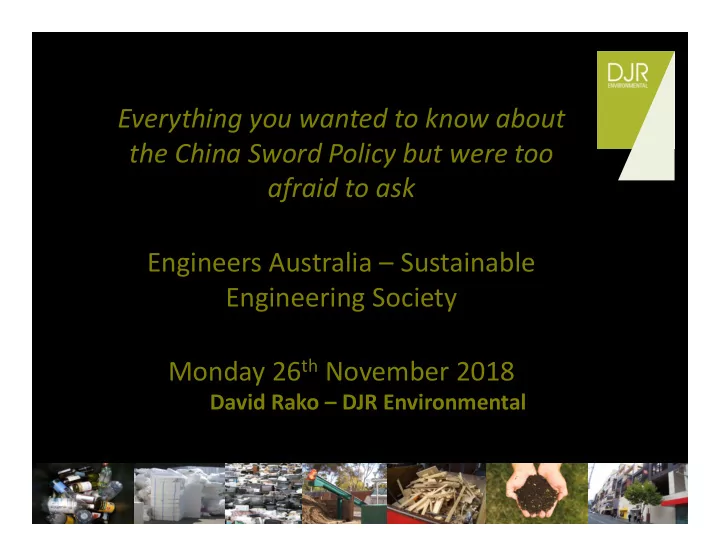

Everything you wanted to know about the China Sword Policy but were too afraid to ask Engineers Australia – Sustainable Engineering Society Monday 26 th November 2018 David Rako – DJR Environmental
Overview of presentation • What is the China Sword Policy and how has it impacted the Australian recycling export markets • Who was asleep at the wheel? • Response from Australian Recycling Industry • Federal & Victorian State Government Response • Short Term & Long Term Impacts • Where to from here?
Kerbside Recycle Bins
What is the China Sword Policy and impact on Australian recycling export markets • In July 2017 Chinese Government notified the World Tarde Organisation that it intended to amend the import of 24 kinds of solid wastes • These included plastics and unsorted paper waste • Rationale was large amounts of dirty & hazardous materials had been mixed with imported solid waste to be reused as raw materials • This was having a negative impact on China’s environment & human health
What is the China Sword Policy and how has it impacted the Australian recycling export markets • These import restrictions have resulted in a significant reduction in the value of scrap plastic & paper/cardboard • In addition the sale of scrap plastics & paper/cardboard to China has dramatically reduced • In January 2017 around 71% of Australian exports of scrap plastic and scrap paper/cardboard were exported to China (98,000 tonnes of the 139,400 tonnes total), by January 2018 this had fallen to 34% of Australian exports (43,200 tonnes of the 128,200 tonnes total)of exports ceased • This has resulted in a saturation of these recyclables onto international markets and resulted in a significant fall in value of these recyclables • All other clean recyclables still have a viable end markets; plastics, cardboard, metals and paper; however there has been a correct to the price being paid from China
Recyclables Price Falls Source: China’s recycling ‘ban’ throws Australia into a very messy waste crisis 27/4/18
Who was asleep at the wheel • In Australia we were all asleep at the wheel as writing on the wall from early 2011 • In 2011 China introduced the Green Fence program, that tightened inspection efforts to reduce the amount of contaminated materials entering the country • In 2013 Chinese Government adopted a policy of Operation to ban all unwashed plastics • On 18 July 2017 China announced to the World Trade Organisation that it will no longer accept certain kinds of solid wastes from 31 December 2017
Response from Australian Recycling Industry • Visy enforced its force majeure contract conditions • Informed collection companies that due to the CHINA CRISIS it would cease collecting all kerbside recyclables • In the future when the end markets improved it would have first option to restart the contracts • Visy then informed collectors they could now take the recyclables but would be charging a $60.00 (+GST)/tonne gate fee, many companies were delivering clean recyclables for free • Other recycling companies including SKM Recycling and Polytrade followed the Visy model
Impact on kerbside collection companies
Federal & State Government Response • Victoria: $13M funding package to assist local government to cover the $60/tonne charge till 30 th June 2018, after which Council via rates increases need to cover the cost • New South Wales: $47M funding package to local government as rates are capped and Councils cannot increase rates for kerbside collection • South Australia: $300,000 grant rescue package reviewing a $7M funding package for local government • Federal Government: launched new target 70% of plastic bags recycled by 2025 and new recycling label launched
Government Responses Overseas • Canada starting planning for this China ban from 2013 investing in new industries within Canada recycling recyclables into new end products • North America has a robust recycling industry with facilities coming on-line from between 2010-2015 • There has been ongoing debate that we cannot develop in Australia that we cannot recycle at home as labour and costs too expensive • Critical to have your end markets developed and locked – in without this recycling business will fail
Short Term & Long Term Impacts SHORT TERM: - Small recycling collection companies will shut down due to drop in prices being paid - Increased stockpiles of recyclables causing fire risk - Potential for some types of recyclables ending up in landfill due to no end markets for plastics LONG TERM: - New collection systems to reduce contamination - Government support for the end products - Increase in cost for collection of recyclables - Development of Energy from Waste facilities
Where To Fro Here? • New opportunity to develop and grow local recycling industry • Value add to recyclables here within Australia • Generate new jobs and investments within Australia • Need the Federal Government to lead the way with State Government’s following lead • This is a significant opportunity
Top 5 Contaminants in Recycling Bin 1. Soft plastics; shopping bags, cling wrap and packaging and wrappers 2. Clothing cannot be processed at recycling centres, so donate to a local charity instead i.e. Salvo’s 3. Keep items out of plastic bags. This one is easy: just bin it – don’t bag it! All recycling items should be loose in the bin. 4. Leave green and food waste out of the recycling bin. If you have a green bin, put all your grass clippings, pruning's and garden waste in there. 5. E-waste; electrical items, phones, cables, batteries and computers. E-waste recycling might be in place at your local transfer station
Thank You David Rako DJR Environmental M: 0400 002 600 E: david@djrenvironmental.com
Recommend
More recommend